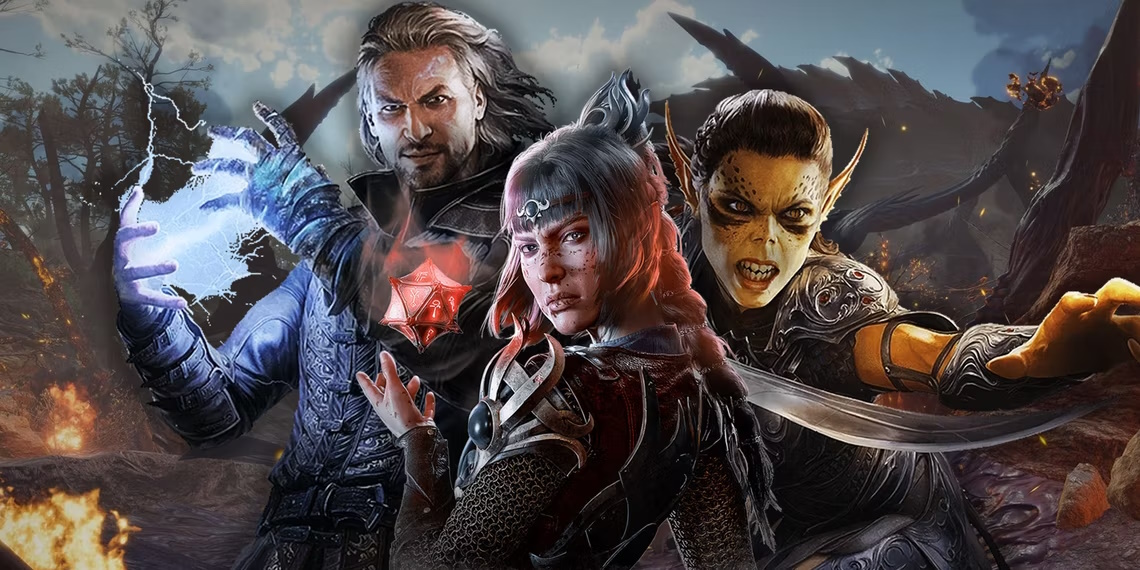
The world of Baldur's Gate 3 is steeped in divine influence, where gods hold sway over the lives of both mortals and adventurers. While they are bound by an unspoken command not to directly interfere in the mortal realm, the gods of this realm find clever ways to shape the course of events in Faerun. In this article, we will delve into the intricate pantheon that governs Baldur's Gate 3, shedding light on their roles, worshippers, and the impact they have on the game's narrative.
The Divine Connection
Understanding the gods in Baldur's Gate 3 is crucial for players and characters alike. When creating a character to explore Faerun, it's essential to know which gods exist and comprehend their significance in the game's lore. This knowledge becomes even more critical if your character is a cleric, as their magical powers are derived from their chosen patron deity. Worship and devotion to a specific god keep the conduit open for clerics to harness their divine powers. Your choice of god can also significantly influence dialogue options and provide unique insights into situations that might elude other characters.
Patron Deities in Baldur's Gate 3
Below is a list of notable deities revered in Baldur's Gate 3:
- Selune - The Goddess of the Moon, and the twin sister of Shar. Selune's influence is prominently felt in Act 2 of the game and within Shadowheart's storyline.
- Bahamut - The Dragon-God of Justice, and the brother of the malevolent goddess Tiamat.
- Tempus - A God of War and patron of soldiers.
- Tyr - The God of Law and Justice.
- Helm - The God of Guardians.
- Ilmater - The God of the Oppressed.
- Mystra - The Goddess of the Weave, whose presence looms large in Gale's narrative.
- Oghma - The God of Invention.
- Moradin - Worshipped by dwarves, Moradin is the God of Smiths, Artisans, and Miners.
- Kelemvor - The God of the Dead and the Afterlife. Conversations with Kelemvor's clerics offer unique insights.
- Corellon Larethian - The Creator of the Elves and leader of the Elven pantheon.
- Garl Glittergold - The Gnomish God of Trickery and Humor.
- Yondalla - The Halfling God of Nature.
- Lolth - The Spider-Queen Goddess of the Drow in the Underdark, with a strict hierarchical matriarchy.
- Gruumsh - The Orcish God of Victory.
- Tiamat - Sister of Bahamut and considered one of the most evil gods.
- Vlaakith - The lich-queen of the githyanki, possessing god-like power.
- Eilistraee - Goddess of Moonlight, Dance, and Beauty, a beacon of hope for Drow seeking liberation from Lolth's rule.
- Lathander - The God of Dawn.
- Talos - The God of Nature.
- Tymora - The Goddess of Luck.
- Mielikki - The Goddess of Forests.
These deities grant clerics access to divine magic, regardless of their subclass or alignment. However, some restrictions apply; for example, Lolth-sworn Drow clerics can only worship Lolth, while non-githyanki races cannot worship Vlaakith. Clerics also unlock unique dialogue options tied to their patron deity, and NPCs react differently based on their views of the chosen god.
Other Gods in Baldur's Gate 3
In addition to the prominent deities mentioned above, several other gods and divine figures play vital roles in Baldur's Gate 3's rich narrative. These include:
- Shar - The Lady of Loss, twin sister of Selune, and a controversial deity associated with loss and ruin. Shar's worship is often opposed by magic users due to her Shadow Weave.
- Sylvanus - The Oak Father and God of the natural world, revered by most Druids but not typically a deity for clerics.
- The Dead Three - A trio of deities embodying death, including Bhaal, the Lord of Murder; Bane, the Lord of Tyranny; and Myrkul, the Lord of Bones. They hold a significant place in the history of Baldur's Gate.
- Jergal - The Lord of the End of Everything, who serves as a precursor to the Dead Three. Jergal's enigmatic presence in Baldur's Gate 3 suggests intriguing connections to the game's events.
In particular, the character Withers raises intriguing questions about Jergal's involvement, as he appears to operate from a Temple of Jergal within the Dank Crypt. Withers' actions and his ability to revive companions hint at a deeper connection to the gods and their influence on the mortal world.
As players journey through the ever-evolving narrative of Baldur's Gate 3, the gods and divine entities continue to shape the destinies of Faerun's denizens. Whether you are a cleric seeking divine favor or an adventurer caught in the webs of godly intrigue, the pantheon of Baldur's Gate 3 remains a vital aspect of the game's storytelling and lore.
Baldur's Gate 3 is currently available on PC, with a release on PS5 on September 6 and an upcoming release on Xbox Series X/S later this year.
Leave a Reply